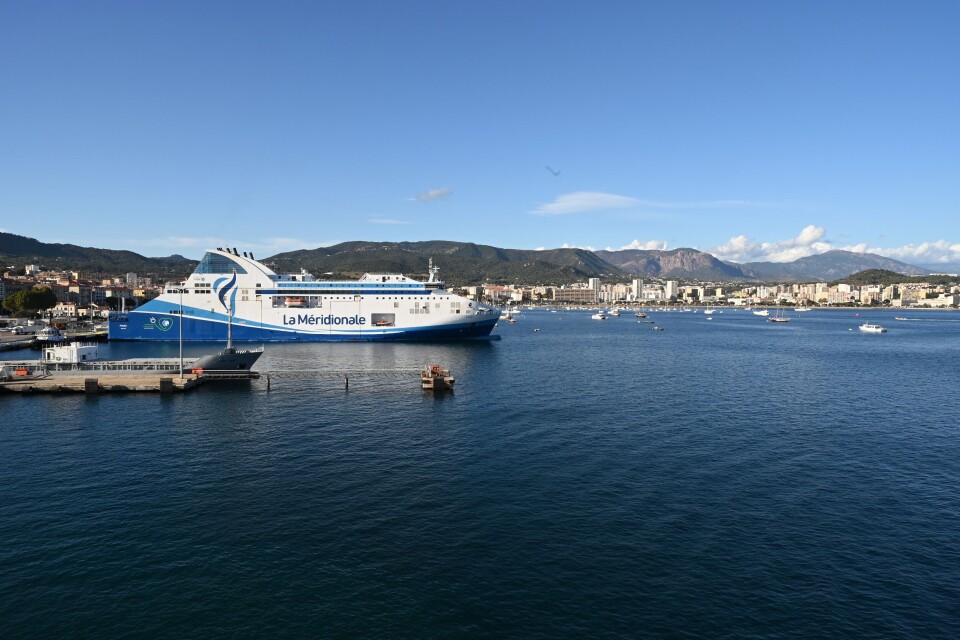-
Free fraud service for UK homeowners living in France
Owners are encouraged to sign up for a free monitoring service from HM Land Registry to reduce risk
-
New civic tests for foreigners in France launch amid criticism
Applicants for some types of residency cards must now take 45-minute test
-
Workers in France can take 17-day break using only eight days of leave in 2026
Favourable calendar for public holidays makes extended May break possible, with five guaranteed long weekends throughout year
‘Zero particulate’ ferry begins sailing between Marseille and Corsica
The boat, which is the first of its kind, has filters designed to capture sulphur oxides and particulates

French shipping company La Méridionale has unveiled its new “zero particulate” ferry, which is to use a filter capturing air pollutants while sailing between Marseille and Corsica.
La Méridionale chairman, Marc Reverchon, told reporters on board the Piana ship that: “It’s an unprecedented solution, a world first” and that the boat was “the cleanest in the Mediterranean”.
The filters installed on the Piana are supposed to capture 99% of sulphur oxides emitted by the engines, along with 99.9% of the particulates created by the heavy fuel oil used on these ships.
It is this type of gas and particulate which causes the vast majority of the air pollution around maritime ports.
They use the same technology as power stations, where sodium bicarbonate is funnelled into the exhaust fumes, reacting with the particles produced in combustion. They are then captured by the air filter.
“[The ship] will not release anything, not in the water, not in the air,” Méridionale CEO Benoît Dehaye said.
A chemicals supplier called Solvay will then dispose of the residue, and will perhaps be able to recycle it in the future.
La Méridionale’s technical director Christophe Seguinot said: “We didn’t have to look too far. We didn’t invent anything. The challenge for us was to make it suitable for a marine setting.”
Heavy fuel oil is a cheap but highly polluting transportation fuel, which is high in sulphur and can cause both respiratory problems and acid rain.
A €15million bill
Installing the particulate filters has cost La Méridionale €15million, €4million of which came from the regional council and €1million from the state.
The company has said that this is only the latest stage in a “strategy aiming to limit [its] environmental footprint”, which began in 2016.
Welcomed by environmental groups
Environmental associations have welcomed the new development, with Dominique Lanfranchi of the Sentinella group saying: “This is the proof that an industrial [organisation] can also work for the environment when it wants to.
“La Méridionale is heading down a virtuous path; we hope that all companies will do the same.”
He also added, however, that it is difficult to impose environmental standards on ferry and cruise companies, because they are often registered in different countries.
Marseille hosts many cruises and other ships, and over 50,000 people have signed a petition calling for action to be taken over the pollution that they create.
Read more: Marseille mayor in row over giant ‘polluting’ cruise ships
"Let's hope that the big polluters follow the example of La Meridionale," the city’s mayor Benoît Payan tweeted on Monday (September 5).
Lutter contre la pollution maritime, inventer ensemble de nouvelles solutions : en équipant le Piana du premier filtre à particules du monde, @lameridionale, à Marseille, entre dans l’Histoire.
— Benoît Payan (@BenoitPayan) September 5, 2022
Espérons que les grands pollueurs prennent exemple sur la Méridionale. pic.twitter.com/xqaGXwTk5d
Other shipping companies also try a technique called ‘scrubbing’, through which water is sprayed into the exhaust fumes, capturing some of the pollutants.
However, the resulting dirty water is often then released into the sea.
There have also been experiments with liquefied natural gas (LNG), which is cleaner than heavy fuel oil.
Related articles
World’s largest cruise ship leaves French shipyard for sea trials
Sailing firm offers greener Channel crossing by catamaran
Best (and worst) airports, new UK route: Nine France travel updates
























